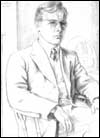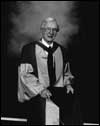Eric Hawkins: A Tribute on Your Ninetieth Birthday*
 Eric Hawkins is in every sense the 'father' of Language Awareness, its setter of standards and source of inspiration. The 1960s was a time when torchbearers of communicative competence as a goal of foreign language teaching were reassessing its relationship to Behaviourist principles of habit formation. Not only did Eric Hawkins endorse this rethinking, but he was so bold as to propose a heresy: the idea that explicit reflection on language (native and foreign) should form part of the school curriculum. Not that it should completely dominate FL teaching, but that its potential as one force for good in FL study should be fully exploited. Such an idea looked at the time like a suggestion to return to the old 'grammar grind', but Eric showed very clearly that this need not be. And he was right. As time goes by his theory gets endorsed by learning and teaching research.
Eric Hawkins is in every sense the 'father' of Language Awareness, its setter of standards and source of inspiration. The 1960s was a time when torchbearers of communicative competence as a goal of foreign language teaching were reassessing its relationship to Behaviourist principles of habit formation. Not only did Eric Hawkins endorse this rethinking, but he was so bold as to propose a heresy: the idea that explicit reflection on language (native and foreign) should form part of the school curriculum. Not that it should completely dominate FL teaching, but that its potential as one force for good in FL study should be fully exploited. Such an idea looked at the time like a suggestion to return to the old 'grammar grind', but Eric showed very clearly that this need not be. And he was right. As time goes by his theory gets endorsed by learning and teaching research.
The Language Awareness movement was British in origin, but many of its ideas have been elaborated into European projects in ways that must have delighted this staunch European and internationalist. In 1973 he could express the hope that "English teachers and teachers of modern languages might realise the rich possibilities of working together in presenting 'language' to their pupils." Eric Hawkins dreamed of bridging the vacuum or "the space between" these two cultures: today's curriculum developers with a pan-European perspective talk of "intercomprehension".
The Language Awareness movement has now grown beyond Europe, having become a truly global movement, as an inspection of its membership list and of the origins of the authors of contributions to this journal confirms.
 Another distinctive feature of the Language Awareness movement is its origin in pedagogic practice: it was, and hopefully will remain, a truly "grassroots" movement, conceived and formulated by practising teachers of first and second languages amid the realities of real classrooms. This conception was in the late 1960s a tiny spark that Hawkins spotted the immense potential of and that he chose to nurture. Yet his modesty does not allow him to take the credit for such vision. He attributes in his 1992 paper in this journal the origination of the term 'Language Awareness' to Michael Halliday's Introduction to P. Doughty et al.: Language in Use: A Schools Council Programme in Linguistics and English Teaching (1971). This is so characteristic of this man, who goes to such lengths to conceal his many achievements. He admits with patent embarrassment, if you press the point, that he was mentioned in military dispatches in 1945 and attained the rank of Major in the British army, that he became the first gold medallist of The Institute of Linguists in 1971, and that in 1973 he was awarded the CBE for his services to Education, and honoured with L'Ordre des Palmes Academiques in 1986.
Another distinctive feature of the Language Awareness movement is its origin in pedagogic practice: it was, and hopefully will remain, a truly "grassroots" movement, conceived and formulated by practising teachers of first and second languages amid the realities of real classrooms. This conception was in the late 1960s a tiny spark that Hawkins spotted the immense potential of and that he chose to nurture. Yet his modesty does not allow him to take the credit for such vision. He attributes in his 1992 paper in this journal the origination of the term 'Language Awareness' to Michael Halliday's Introduction to P. Doughty et al.: Language in Use: A Schools Council Programme in Linguistics and English Teaching (1971). This is so characteristic of this man, who goes to such lengths to conceal his many achievements. He admits with patent embarrassment, if you press the point, that he was mentioned in military dispatches in 1945 and attained the rank of Major in the British army, that he became the first gold medallist of The Institute of Linguists in 1971, and that in 1973 he was awarded the CBE for his services to Education, and honoured with L'Ordre des Palmes Academiques in 1986.
Peter Downes once referred to Eric Hawkins as "one of the foremost figures in language teaching in the twentieth century." These ideas, of which Language Awareness is but a subset, continue to be elaborated and transformed in the twenty first. Eric Hawkins's contribution to the LA movement was two-pronged. First, he laid its theoretical foundations, in such seminal works as Modern Languages in the Curriculum (1981) and Awareness of Language: An Introduction (1984). Second, he spelt out and exemplified the classroom implications of LA. In fact, we see in the second of these books (1984) theory and practice elaborated in parallel, the first half expounding the rationales, the second half illustrating their classroom implications.
We first recognised Eric Hawkins's immeasurable contribution and commitment to LA in 2002, when The Association for Language Awareness (ALA) elected him its first and sole Honorary Life Member. Then, in 2004, it was decided to honour him further by designating the main keynote paper at the biennial conferences of the ALA The Eric Hawkins Lecture. Today we reiterate our indebtedness to Eric and our deep respect for him by dedicating to him, on the occasion of his ninetieth birthday, this special conference edition of our journal.
Thank you Eric, for inspiring us all. It's January the 8th, so have a great birthday celebration in the bosom of your loving and much-talented family. We look forward to seeing you at our next conference.
Carl James, Chairman of The Association for Language Awareness,
On behalf of the Committee and Membership.
* This tribute to EH was printed in the Lleida ALA 2004 Conference special edition of our journal Language Awareness (Multilingual Matters, 2005)
